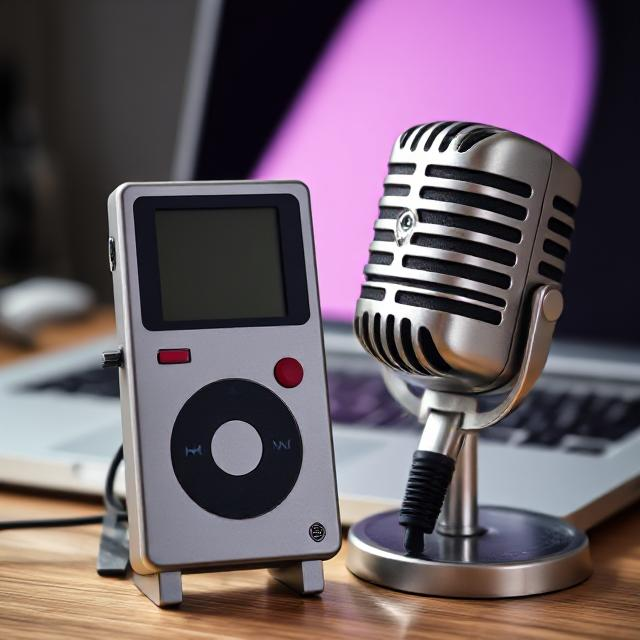Imagine this. You’re on your morning commute, stuck in traffic. Or maybe you’re on a quiet evening jog through the park. Or winding down after a long day. All it takes is a tap on your phone, and suddenly, you’re wrapped up in a fascinating true crime mystery, a motivational pep talk, a hilarious comedy skit, or a deep conversation about your favorite hobby. That’s the magic of podcasts.
But while it might feel like podcasts have always been there, they actually have a pretty unique backstory, a story rooted in podcast history. What started as a passion project for a small group of tech-savvy hobbyists has grown into a cultural and media phenomenon. Today, podcasting stands shoulder-to-shoulder with traditional radio and television, and in some ways, it’s even outpacing them.
Let’s take a journey through Podcast history, from its humble beginnings to the booming industry it is today.
The Birth of Podcasting: A Tech Enthusiast’s Dream
To understand where podcasts came from, we have to rewind to the early 2000s.
At the time, the internet was still maturing, and portable music players like the iPod were gaining popularity. But there wasn’t a smooth way for people to regularly receive and listen to audio content. You couldn’t just stream a show like we do now. You had to download audio files manually, and it was a bit of a hassle.
That’s where RSS (Really Simple Syndication) came into play. It allowed users to subscribe to updates like blog posts or, in this case, audio files that could automatically be delivered to them. This was the groundwork for the podcast format we know today.
In 2004, a British journalist named Ben Hammersley casually suggested the word “podcast” in an article for The Guardian. It was a blend of iPod and broadcast. The name stuck. Before long, a small but growing community of creators and listeners began to form.
These early podcasts were often raw and unpolished. Many were recorded with basic equipment from bedrooms and basements. The content varied wildly from tech discussions and indie music shows to rants and personal diaries. But what they all had in common was passion. People were experimenting. They were connecting. And they were building something new.
These early moments were crucial in shaping podcast history, laying the groundwork for what was to come.
Podcast Evolution: Key Milestones
Let’s dive a bit deeper into some of the key milestones in Podcast history, especially during its early years.
Early Days of Podcasting (2000-2004):
In the very beginning, podcasting had humble roots. After the creation of RSS, Dave Winer, a software developer, and Adam Curry, a former MTV video jockey, collaborated to make the first-ever podcast feed. Their podcast, Daily Source Code, launched in 2004, is considered one of the pioneers in the field.
The Growth of Podcast Directories (2005-2010):
Around 2005, iTunes added podcasts to its platform, making it easier for users to discover podcasts. This was a game-changer, as it allowed creators to reach a larger audience. Around the same time, other podcast directories such as Stitcher began to emerge, giving listeners more options and control over how they consumed content.
The Rise of True Crime and Serial (2014):
The release of Serial in 2014 changed everything. It wasn’t just a true crime podcast; it was an event. The show’s storytelling style and serialized format inspired many other creators to follow suit. Serial also showed that podcasts could break into mainstream media, making them legitimate entertainment for a wide audience, not just niche communities.
Celebrity Influence (2015-2018):
Big-name celebrities like Marc Maron, Joe Rogan, and later, Michelle Obama, Conan O’Brien, and Oprah Winfrey launched their own shows, bringing millions of new listeners into the podcasting world. This era was crucial in shifting the perception of podcasts from an underground hobby to a mainstream media format. Shows like The Joe Rogan Experience became massive platforms for cultural conversation, solidifying podcasts as essential entertainment media.
The Turning Point: When Podcasts Went Mainstream
For about a decade, podcasts stayed under the radar. They had loyal followers, but the general public wasn’t tuning in just yet. Then came a game-changer.
In 2014, a podcast called Serial launched, and it blew the doors wide open. Produced by Sarah Koenig and her team at This American Life, Serial was a true-crime podcast that followed the story of a real-life murder case. Each episode ended on a cliffhanger, pulling listeners deeper and deeper into the mystery. It was compelling, suspenseful, and brilliantly produced.
People were hooked. This was a defining moment in podcast history, showing the medium’s power to captivate the world.
Serial became the first podcast that many people had ever listened to. It reached millions of downloads and got mainstream media coverage. Suddenly, podcasts weren’t just something nerds listened to; they were cool. They were binge-worthy. They were everywhere.
At the same time, a few other things were happening behind the scenes:
- Smartphones were now the norm, and podcast apps came pre-installed on iPhones.
- Streaming became easier and more accessible; no need to sync your iPod anymore.
- Big-name celebrities and media companies started launching their own shows, lending legitimacy and star power to the format.
These shifts marked a significant milestone in Podcast history, a moment when podcasting truly entered the mainstream.
The Golden Age of Podcasting: A World of Stories
Fast forward to today, and we’re living in what many consider to be the Golden Age of Podcasting.
There are now millions of podcasts out there, spanning every genre imaginable: news, education, comedy, health, spirituality, parenting, sports, science fiction—you name it. And the beauty of it? Anyone can start a podcast.
Unlike traditional media, which often requires expensive equipment and corporate backing, podcasting remains one of the most accessible creative platforms out there. With a good microphone, a quiet room, and an internet connection, you can record and publish your own show. No gatekeepers. No fancy studio needed.
This accessibility has led to an explosion of diverse voices in the podcasting space. People from underrepresented communities have found a space to tell their stories, share their culture, and connect with like-minded individuals around the world.
Another fascinating chapter in Podcast history is in education. Beyond entertainment, podcasts have become valuable educational tools. More and more people are turning to podcasts as a way to learn on the go. Universities post lectures, language teachers record mini-lessons, scientists explain big ideas, and activists use the platform to raise awareness on important issues. It’s not just entertainment anymore; it’s empowerment.
Listener Behavior: A New Way to Engage with Media
Podcast listeners engage with content differently than traditional TV or radio audiences. Many podcast listeners multitask during their listening experience, which gives podcasting a unique dynamic.
Podcasting and the “Second Screen” Culture:
A key feature of podcasting is its ability to fit into the “second screen” culture—people listen while working, exercising, or commuting. Unlike TV shows that demand full attention, podcasts allow listeners to engage in other activities. Studies have shown that podcast listeners retain more information and have a deeper connection to the content because they often listen with full focus during these moments of multitasking.
Podcasts for Learning and Self-Improvement:
Beyond entertainment, podcasts have become a platform for learning and self-improvement. Educational podcasts have exploded in popularity, allowing listeners to learn new skills or understand complex topics in a casual and accessible format. For example, podcasts about coding, business strategies, or mental health are growing, catering to the self-driven learner who wants to improve while on the go. Shows like How I Built This and The Tim Ferriss Show provide listeners with insights from successful entrepreneurs and experts.
This behavioral shift is a modern development in podcast history, where listeners interact differently with media.
Challenges and Opportunities: A Competitive Space
While podcasting has thrived, there are still some challenges, and opportunities are emerging with new formats and technologies.
Discovery Challenges in a Saturated Market:
As more podcasts are created, finding new shows can be difficult. With millions of podcasts to choose from, discovering new content often depends on algorithms, social media, or word of mouth. The “podcast discovery” problem is something that platforms like Apple Podcasts, Spotify, and Google Podcasts continue to address, adding curated playlists, personalized recommendations, and niche directories to help users find the content they love.
Innovative Podcasting Formats:
The future of podcast history is expanding with new formats. Hybrid podcasts, which combine elements of video and audio, are starting to grow in popularity. Shows like The Joe Rogan Experience now often incorporate video, offering listeners a more immersive experience. Interactive podcasts, where listeners can vote on the direction of a story or participate in live call-ins, are also increasing in number. These innovations are changing the way we engage with the medium.
Monetization and Creator Opportunities:
For creators, monetization has been a long-standing challenge. Traditional ads are still a key revenue stream, but many podcasters are now turning to listener support models like Patreon, exclusive content subscriptions, and even crowdfunding to sustain their shows. Live events and branded merchandise are also providing additional revenue streams. As the industry matures, more creators will explore these avenues to turn podcasting into a viable career.
The Future of Podcasting: Innovation Ahead
So, where is podcasting headed next?
The industry is still evolving rapidly. New technologies and business models are shaping the next phase of this medium.
- Artificial Intelligence is being used to help creators with editing, transcription, and even generating content ideas.
- Smart speakers like Alexa and Google Home are making it even easier to listen to podcasts without lifting a finger.
- Global expansion is in full swing, with non-English podcasts on the rise, reaching listeners in every corner of the world.
We’re also seeing new ways for creators to monetize their work. While traditional ads are still a major source of revenue, many podcasters are turning to subscriptions, Patreon, or exclusive content deals with networks to make a sustainable living from their shows. The future looks bright, and the landscape is constantly shifting, bringing new opportunities for creators and listeners alike.
Conclusion: The Unstoppable Rise of Podcasting
From its modest beginnings as an experimental tech hobby to its current status as a cultural powerhouse, podcasting has come a long way. What makes podcasting unique is its ability to bring people closer together, whether by sharing stories, offering insights, or simply making people laugh.
The future of podcasting is full of promise. As new voices enter the space and technology continues to evolve, we can expect to see even more creative and innovative ways to engage with the medium. What began as an underground movement has blossomed into an unstoppable force in the media world, and the possibilities for growth are endless.
As podcast history continues to unfold, creators must adapt to new technologies, formats, and audience expectations.



